Anubis is a prominent figure in Egyptian mythology, often depicted as a jackal or a man with the head of a jackal. He is known as the god of mummification and the afterlife. Anubis tattoos can hold different meanings, depending on the design, placement, and cultural background of the wearer. In this article with Impeccable Nest, we will explore the symbolism behind Anubis tattoos and their various interpretations.
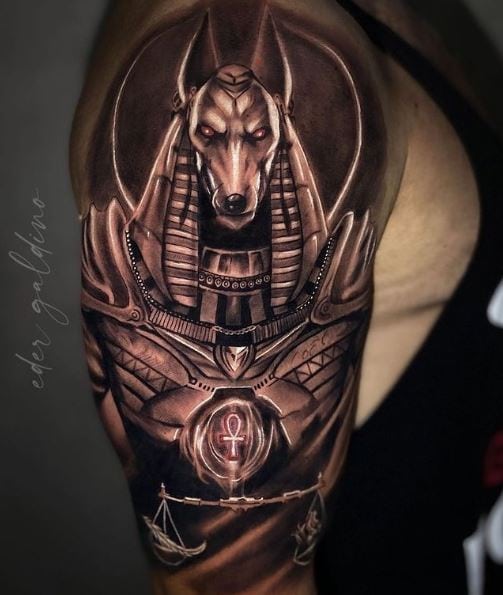
Origins of Anubis Tattoos
Anubis tattoos have been around for centuries, originating from ancient Egyptian culture. Egyptians believed in the concept of the afterlife, where the soul goes through a journey to reach the other world. Anubis played an important role in this process, serving as a guide for the deceased through the underworld. His role in mummification also made him associated with death and rebirth.
Today, Anubis tattoos are popular among both men and women, symbolizing qualities such as strength, protection, guidance, and spirituality. Here are some common designs and their meanings:
| Design | Meaning |
|---|---|
| Anubis Head | Protection and Guidance |
| Anubis Holding Ankh | Eternal Life |
| Anubis Holding Scales | Judgement |
| Anubis with Hieroglyphs | Cultural Pride |
| Anubis with Eye of Horus | Divine Protection |
Interpretations of Anubis Tattoos
Anubis tattoos can represent different things to different people. Here are some interpretations of Anubis tattoos:
Spiritual Beliefs
For individuals who adhere to Egyptian paganism or engage in modern spiritual practices, Anubis tattoos hold significant meaning and significance. Anubis is an ancient Egyptian deity associated with mummification, the afterlife, and the journey of the soul into the underworld. He is often depicted as a jackal or a man with a jackal head and was believed to guide the souls of the deceased through their transition from life to death.
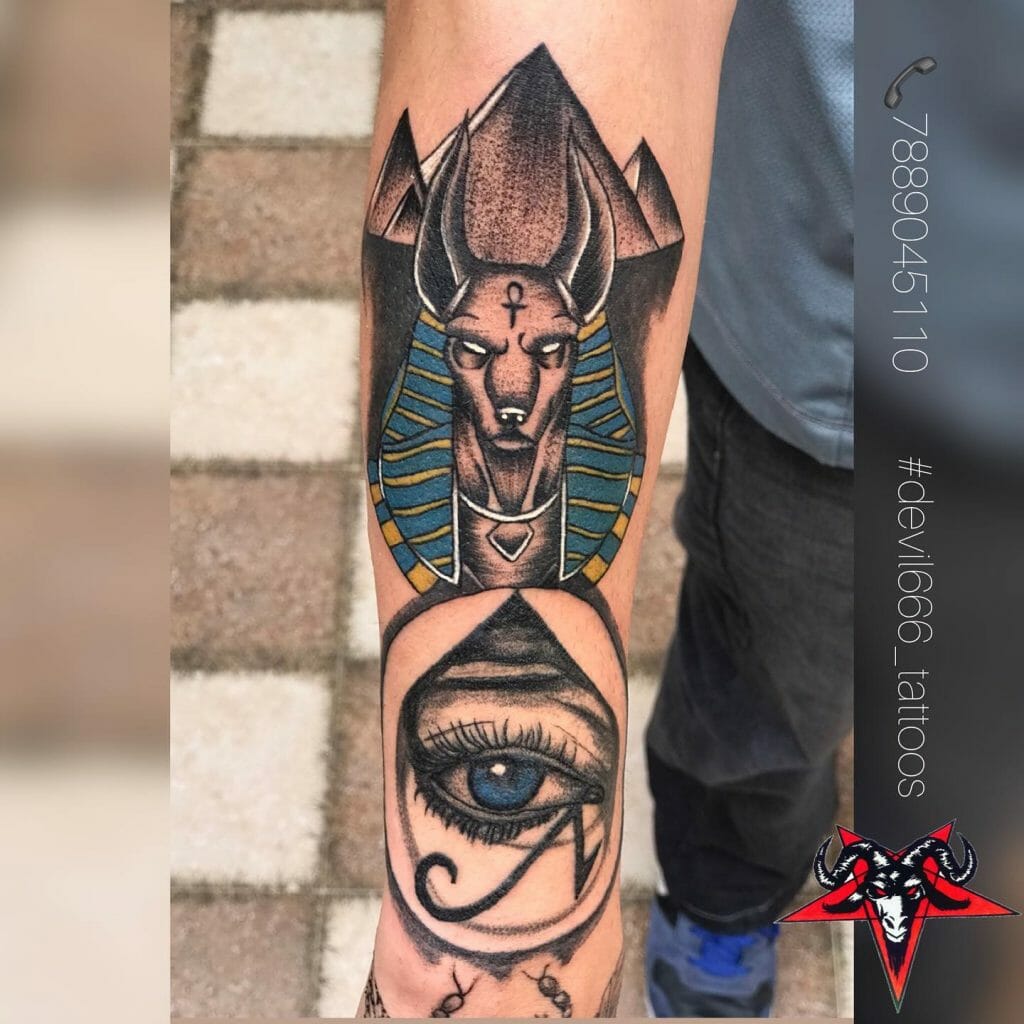
An Anubis tattoo can be a means for devotees to pay homage to this powerful deity, and seek his divine guidance and protection. The tattoo may depict Anubis in various forms, such as the traditional jackal-headed figure, or other representations that are meaningful to the wearer. Some people choose to have Anubis tattoos accompanied by hieroglyphics or other symbols that represent aspects of Egyptian mythology or spirituality.
Beyond honoring Anubis, these tattoos may also serve as a reminder of the cyclical nature of life, death, and rebirth. In ancient Egyptian culture, death was viewed not as an end but as a transition to the afterlife, where the soul would be judged before continuing on to its final resting place. An Anubis tattoo can symbolize this belief in the continuity of existence beyond physical death.
Moreover, Anubis tattoos can represent an individual’s connection to the spiritual realm and their faith in a higher power. Through these tattoos, one may seek to embody the characteristics and qualities associated with Anubis, such as protection, guidance, and guardianship. They may also serve as a talisman or amulet, providing a sense of spiritual protection and comfort.
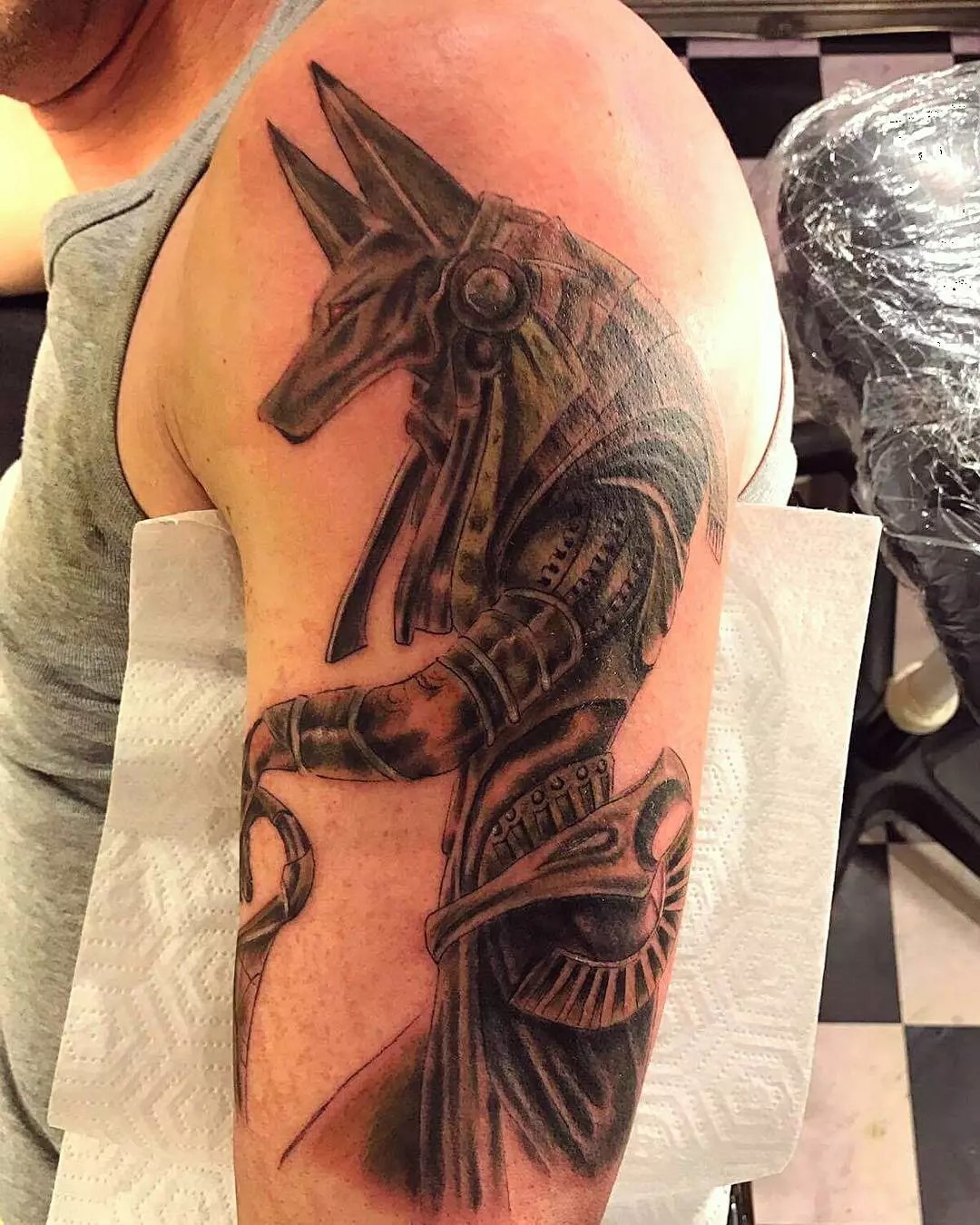
Overall, Anubis tattoos hold deep meaning and significance for those who follow Egyptian paganism or modern spirituality. They serve as a powerful symbol of devotion, connection to the divine, and belief in the transformative power of death and rebirth.
Protection and Strength
Anubis tattoos are a popular choice for those seeking to express their reverence towards the ancient Egyptian god, Anubis. Anubis was known as the god of mummification and the afterlife, as well as being associated with funerary rites and the weighing of souls. His likeness is often depicted as a jackal or a man with a jackal’s head.
For people who practice Egyptian paganism or contemporary spirituality, Anubis tattoos can serve as a powerful symbol of their connection to this deity and the spiritual world. Anubis is considered to be a guide for the dead in the afterlife, and by invoking his presence through a tattoo, individuals may feel a sense of protection and guidance throughout their lives.
Additionally, Anubis tattoos can also represent the cycle of birth, death, and renewal that is central to many religious and spiritual traditions. This symbolism reflects the idea that life is a journey with many cycles and phases, and that death is not an end but rather a transition into a new phase of existence. By wearing an Anubis tattoo, the wearer acknowledges the role of Anubis in guiding souls through this cycle and affirms their belief in a supreme being or higher power.
Overall, Anubis tattoos are a meaningful way for individuals to express their spirituality and connection to ancient Egyptian mythology. Whether as a reminder of the cycle of life or a symbol of reverence towards a specific deity, these tattoos can hold deep personal significance for those who choose to adorn themselves with them.
Personal Transformation
Anubis tattoos are a popular choice for those seeking to express their desire for personal transformation and growth. This is because Anubis, the god of mummification in ancient Egyptian mythology, was associated with the process of death and rebirth. In this context, Anubis represented not just physical death, but also the notion of transformation and renewal.
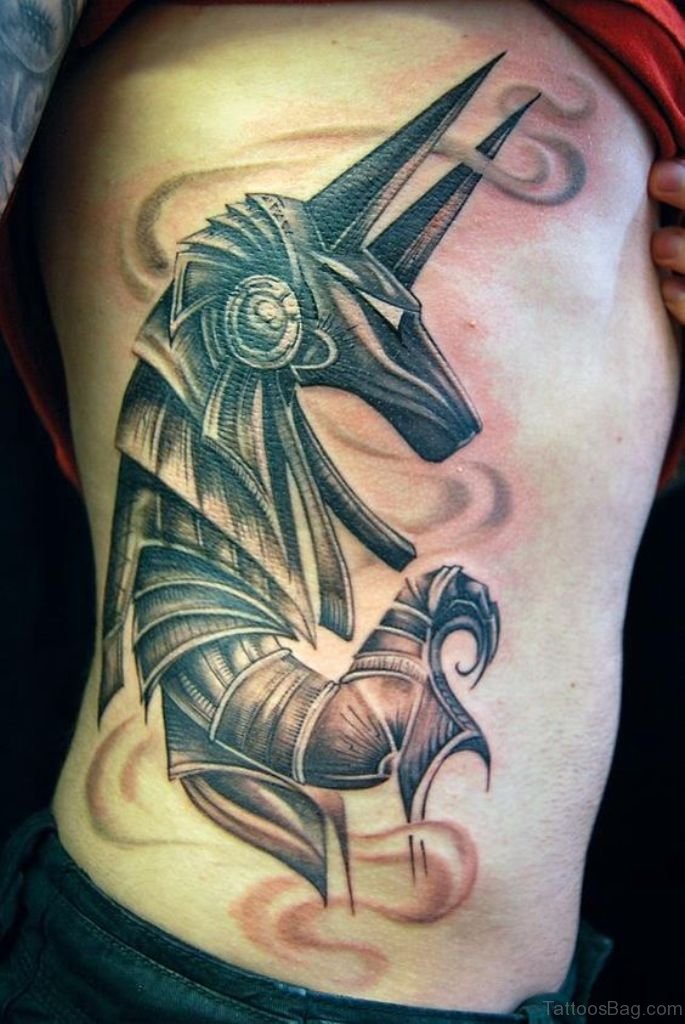
By wearing an Anubis tattoo, individuals can symbolize their desire for change and self-improvement. The image of Anubis can serve as a reminder that transformation is a natural part of life, and that there is always room for growth and improvement. Such a tattoo can be a powerful visual representation of an individual’s commitment to personal development, and can inspire them to pursue their goals with renewed vigor.
Moreover, Anubis tattoos can also serve as a way to honor the past while embracing the future. As the god of mummification, Anubis played an important role in ancient Egyptian funerary rites, helping to ensure that the deceased received a proper burial and transitioned to the afterlife. By donning an Anubis tattoo, individuals can pay homage to this rich cultural heritage while also expressing their own personal values and aspirations.
Overall, Anubis tattoos are a meaningful and versatile symbol that can represent many different things, from personal transformation and growth to honoring one’s cultural heritage. Whether worn as a source of inspiration or simply as a beautiful piece of body art, an Anubis tattoo can be a powerful expression of individual identity and values.
Exploring Different Variations and Designs of Anubis Tattoo Artwork
Tattoos are representative of a person’s identity and, in many cases, can be used to express deep connections. Anubis tattoos are a very popular design choice for many due to the historical significance of Ancient Egypt associated with them. The god of mummification and the afterlife is seen as an influential figure in spiritual realms and often serves as a powerful reminder that life is fleeting. Anubis tattoos can come in many variations and designs, ranging from traditional symbols to more modern interpretations.
Traditionally, Anubis tattoos were simple images of a dog-like creature commonly found on the tombs of ancient Egyptians. This ancient form was often used to embody greater messages about life after death or trials experienced along the way. While these types of simplistic shapes are still popular today, many now opt for creative tattoo elements surrounding those core pieces. Drawing inspiration from both past cultures and modern adaptations allows these tattoos to become deeply personal works of art. Common additions include wings symbolizing movement between realms, hieroglyphs speaking to everlasting memories, or Egyptian gods such as Amun-Ra signifying magnificence. Such combination styles are much more suitable for larger canvases, which speak further on interconnections between worlds—just one part representing our current selves and another showing what we carry over into eternity.
The incredible amount of detail available with Anubis tattoos really makes them stand out among other tattoo selections. Realistic depictions have intricate fur textures mimicking known African breed wildlife structures, while others show primitive detailing hinting at their history in the sands of time. Colors have also become a way of adding even more depth to each piece, allowing us to celebrate culture in ways that were only surface-level before. By combining gold shining brightly alongside bright red palette blends, certain tattoos have a majestic feel, perfect for conveying respect towards divine figures. Other darker colors, like blues, often chosen here befit well with nightmarish shadows, giving off an aura of forgotten places and emphasizing both power and mystery all within one piece!
Anubis tattoos can encompass so much when it comes down to artistic expression, depending on how far the recipient’s wishes go with their inner vision made manifest! With such variety available across body forms, anyone seeking influence from the underworld knows they will find what’s right to match whatever feelings may shape their own outlook on mortality!
Understanding Ancient Egyptian Mythology as It Relates to Anubis Tattoos
Anubis is a powerful Egyptian symbol and one of the most important deities in Egyptian mythology. As the god of mummification, he’s closely associated with Osiris, Horus, and Set as part of the riches of Egyptian mythology’s many gods and goddesses. As tattoos grow in popularity among people all over the world, Anubis tattoos have also become a popular option for people exploring their relationships with ancient cultures.
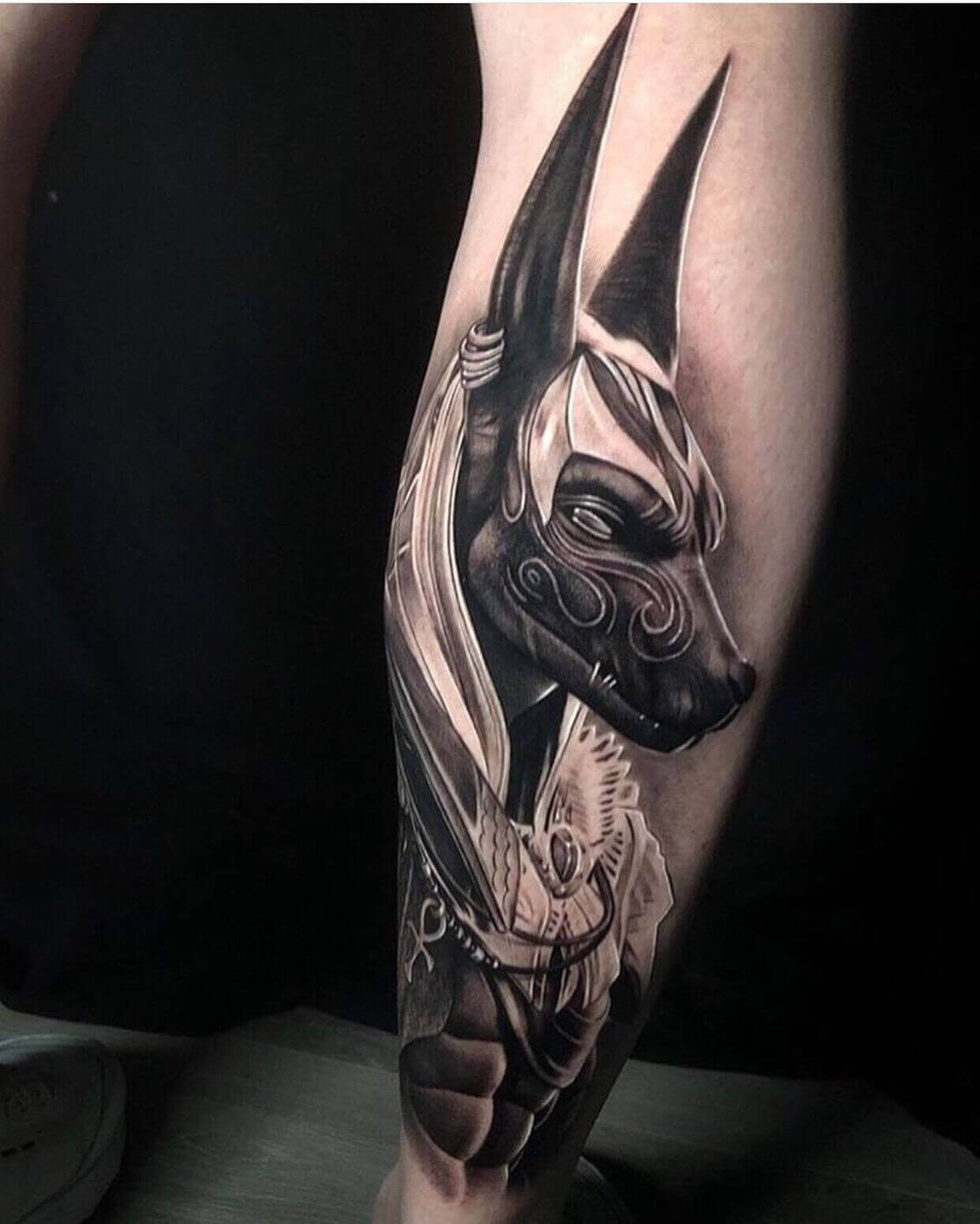
In Egyptian belief, Anubis is aptly known as “he who is upon his mountain”. He’s seen as a protector since he was assigned by Osiris to watch over those who had passed through the gates between this life and the afterlife. Preservation is an important element when it comes to honoring the soul of the deceased and being theirs forever after they cross over; thus, it became fundamental to images of Anubis throughout history.
Most commonly depicted as a black jackal-headed man wrapped up in red or white robes or linen entwined in green wreaths of flowers, funerary art such as amulets and statuary often portrays Anubis overseeing mummies during the process of embalming, showing him using tools typical to burial practices such as pliers and scalpels, intrinsically linked with his role as both embalmer and protector of souls venturing from this life towards the realms beyond measured time.
But aside from these spiritual connotations behind Anubis, having a tattoo like that can be about so much more than just remembering an ancient belief system. It can symbolize a personal transformation journey, which is especially useful for someone wanting to make changes in their life following a stressful experience or difficult transition period. Besides would-be game changers, these tattoos are very popular amongst readers, researchers, or anyone looking for a deeper understanding of the symbols integral to the Egyptian belief system, offering not only outside information but also personal experiences related to death or mortality.
Anubis remains tattooed today, whether worn obscurely, pompously drawn on varied limbs, or fully detailed, judging his underworld court from beneath layers of colored skin, consistently representing faithfulness, memorization, and eternity across generations that come together at the temple’s honored walls crafted long ago, which stand still amidst immortal emblems meant to embrace our passing selves within abstractions found only through divination, and now shared collectively through Anubis’ oldest story adapted into new tales composed directly upon our lives…
Placement of Anubis Tattoos
The placement of an Anubis tattoo can also affect its meaning. Here are some common placements and their interpretations:
Chest
An Anubis tattoo on the chest can hold significant symbolic meaning for those who choose to adorn their body with it. In ancient Egyptian beliefs, Anubis was the god of embalming and mummification, as well as the guardian and protector of the dead. He was also responsible for weighing the heart of the deceased against the feather of Ma’at during the final judgment in the afterlife.
The heart was considered the center of the soul in ancient Egyptian beliefs, and it was believed that a pure heart was necessary for an individual to enter the afterlife. An Anubis tattoo on the chest can represent the wearer’s desire for a pure heart and moral balance, as they seek protection and guidance in their journey through life.
Moreover, Anubis is often depicted as having the head of a jackal, which is associated with loyalty, cunning, and adaptability. These qualities may also be reflected in the wearer’s personality or desired traits, making the Anubis tattoo a personal and meaningful symbol.
Overall, an Anubis tattoo on the chest can serve as a reminder of the wearer’s desired moral compass, and their hope for guidance and protection throughout their life’s journey.
Arm
An Anubis tattoo on the arm is a powerful symbol that can convey a variety of meanings. Anubis, an ancient Egyptian deity, was often depicted as a jackal or dog-headed figure and was associated with death, mummification, and the afterlife. However, he was also seen as a guardian, protector, and guide to the afterlife.
The arm, as a body part, is often associated with strength, power, and physical prowess. It is the part of the body that is used for actions like lifting, pushing, pulling, and throwing. The arm represents one’s ability to act on their goals and overcome obstacles in their path. It is a symbol of determination, willpower, and perseverance.
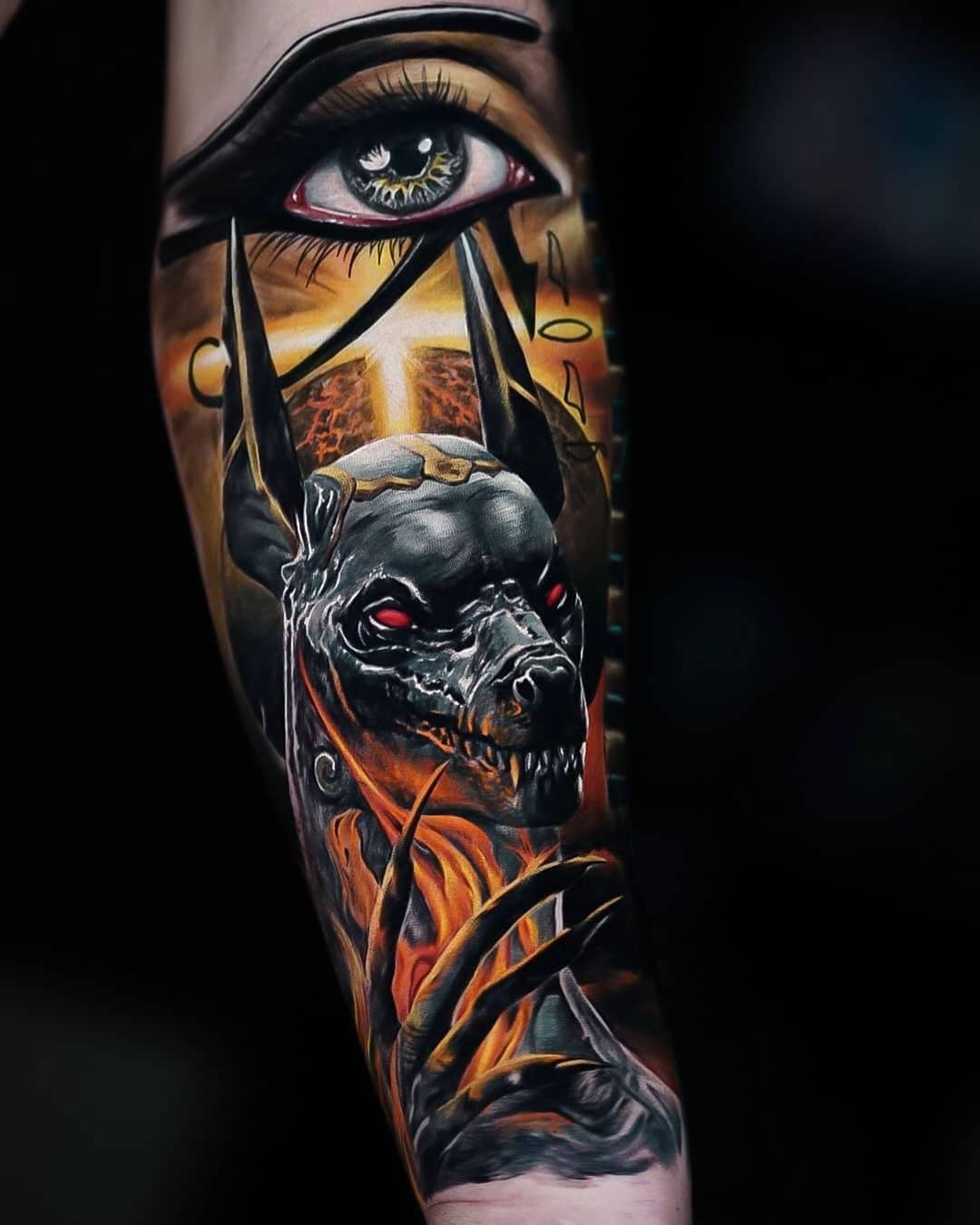
When combined, an Anubis tattoo on the arm can signify the wearer’s strength and power, both physically and mentally. It can represent their belief in themselves and their ability to achieve their dreams despite any challenges they may face. The tattoo can serve as a reminder to stay focused and determined on their path towards success, and to never give up no matter what obstacles come their way.
An Anubis tattoo on the arm can also be interpreted as a tribute to the ancient Egyptian culture and mythology. It can be seen as a connection to the history and traditions of a civilization that believed in the power of gods and goddesses to guide and protect them.
Overall, an Anubis tattoo on the arm is a meaningful and powerful symbol that can represent strength, power, determination, and connection to ancient mythology and culture. It is a tattoo that can inspire and motivate the wearer to overcome any challenges and achieve their dreams.
Back
An Anubis tattoo on the back is a meaningful and powerful symbol that can represent various beliefs, values, and emotions. Anubis is an ancient Egyptian deity who was often depicted with the head of a jackal and the body of a human. In Egyptian mythology, Anubis was the god of mummification, embalming, and the afterlife. He was also considered the protector of graves and the guide of souls to the underworld.
The placement of an Anubis tattoo on the back can hold significant meaning. The back is a crucial part of the body that provides support and stability. It is also one of the largest canvas areas for tattoos, allowing for intricate designs and details to be incorporated. An Anubis tattoo on the back can symbolize the deity watching over the wearer’s journey and offering a helping hand when needed. It can also represent protection and guidance from behind, as if Anubis is always present to shield the wearer from harm.
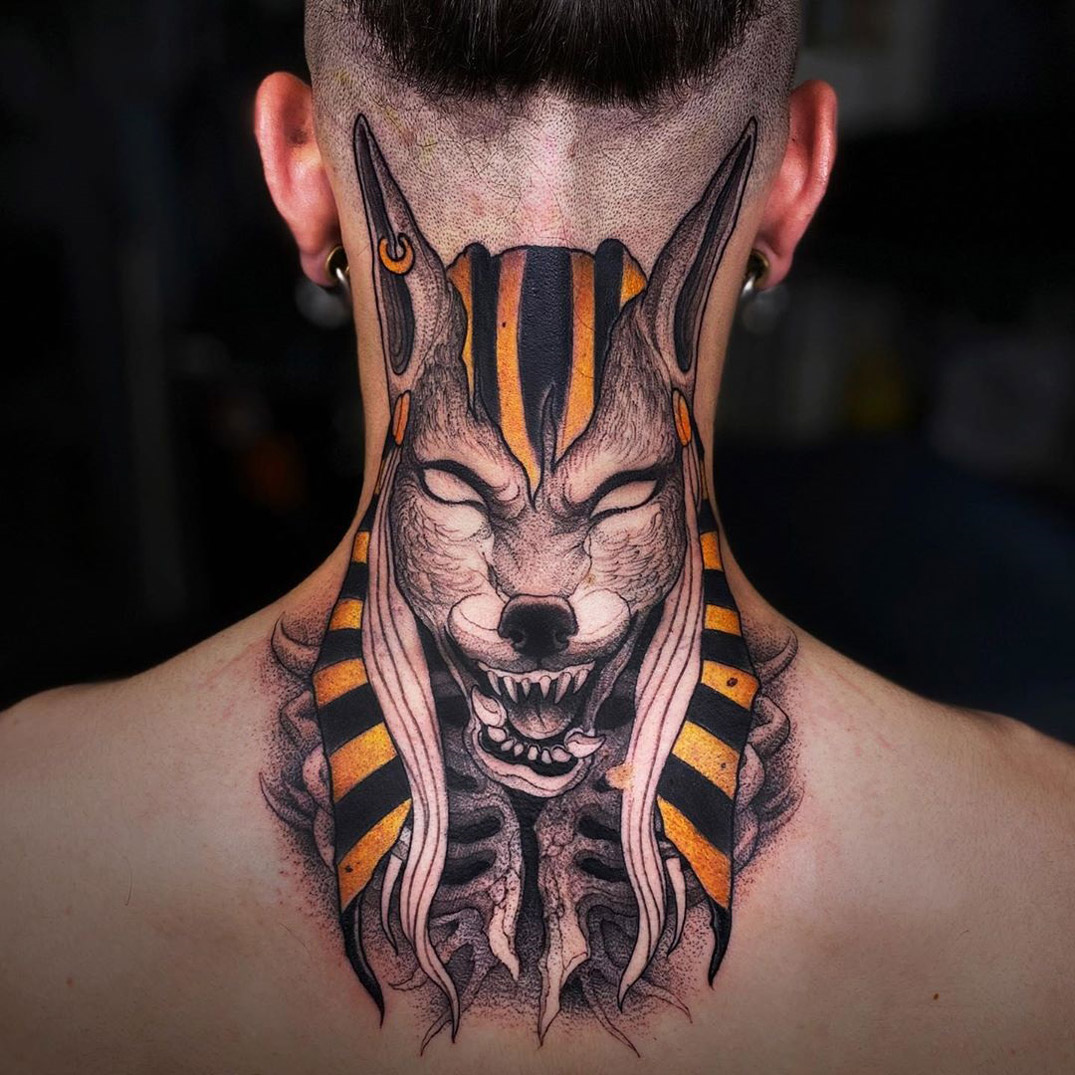
Moreover, the symbolism of Anubis himself represents many important concepts. As a god of the afterlife, he represents the transition from life to death and the journey to a new realm. His role as a guide and protector of souls reinforces the idea that the Anubis tattoo on the back can provide guidance and protection to the wearer on their journey through life. Additionally, his association with mummification and embalming suggests a reverence for death and the understanding that it is a natural part of life.
In conclusion, an Anubis tattoo on the back can hold deep significance and serve as a powerful symbol for those who choose to wear it. It can represent protection, guidance, and support from behind, as well as embodying Anubis’s role in Egyptian mythology as a guide and protector of souls. As with any tattoo, the choice to get an Anubis tattoo on the back should be made carefully and thought
Conclusion
Anubis tattoos have a deep-rooted history in ancient Egyptian culture, and their significance has evolved over time. They can represent different things to different people, from spiritual beliefs to personal transformation. Anubis tattoos can serve as a powerful symbol of protection, guidance, and strength in times of need.

I am Harvey Berry, a tattoo enthusiast who has immersed himself in the diverse world of ink, passionately exploring the beauty and artistry within each tattoo. My mission extends beyond uncovering the aesthetics of tattooing; it involves sharing in-depth knowledge across all aspects of this art form.
Fueled by genuine curiosity and love for every facet of tattooing, I have diligently crafted well-researched articles, with a special focus on the Tattoo Meaning of Impeccable Nest section. Here, my aim is to help the tattoo community gain a deeper understanding of the meanings and values embedded in each tattoo.
One of my primary goals is to encourage responsible decision-making when it comes to getting inked. I recognize that choosing to get a tattoo is a significant personal decision that requires careful consideration. Hence, I provide diverse resources covering the meaning of tattoos, the tattooing process, aftercare tips, and other valuable information.
Whether you are a seasoned tattoo enthusiast or embarking on your first exploration of the world of body art, I aspire to be a reliable resource for you at every step of your journey. I hope that my extensive knowledge of tattoos, especially in the Tattoo Meaning section, will assist you in finding inspiration to express yourself through the art of tattoos.
